I have been in DevOps related jobs for past 6 years dealing mainly with Kubernetes in AWS and on-premise as well. I spent quite a lot …
 :date_long | 6 min Read
:date_long | 6 min ReadHow to GCP Private Service Connect PSC between two VPCs within different projects
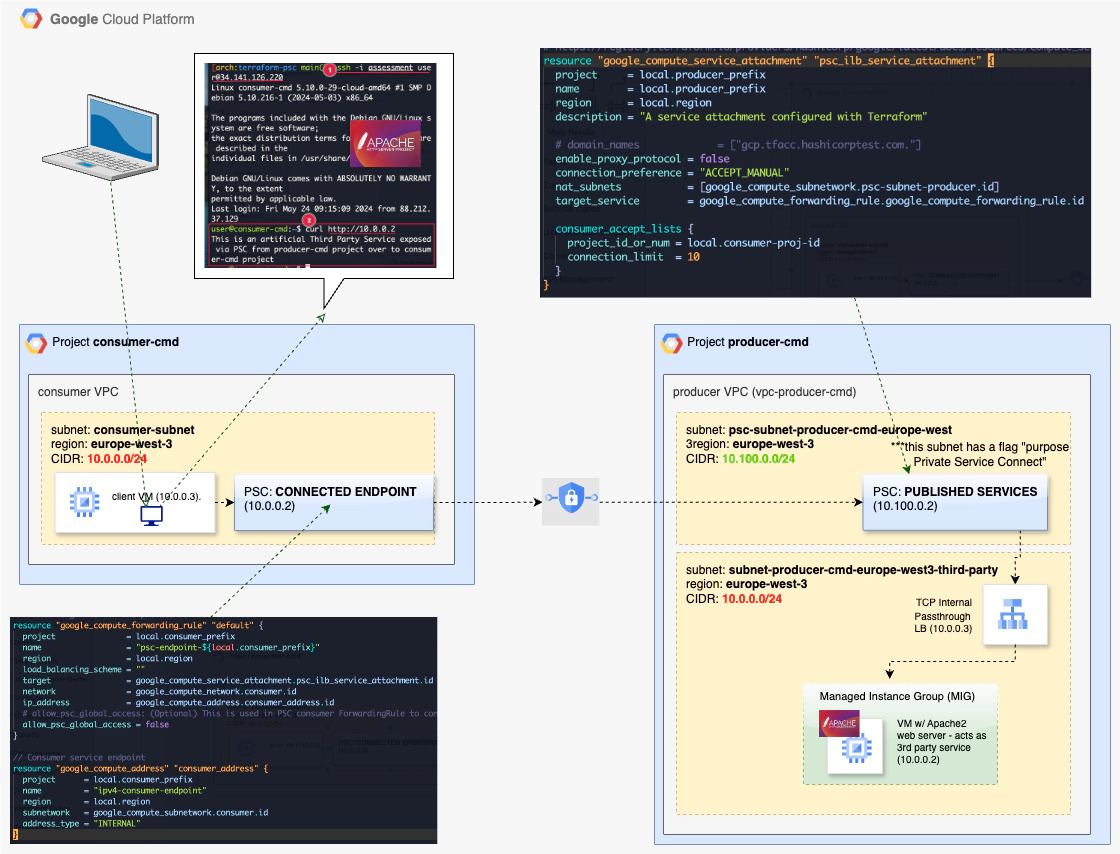
Create 2 new GCP Projects in Free Tier Account
gcloud projects create consumer-cmd --name="consumer-cmd" --enable-cloud-apis
gcloud projects create producer-cmd --name="producer-cmd" --enable-cloud-apis
# verify creation
[arch:devopsinuse main()U] gcloud projects list
PROJECT_ID NAME PROJECT_NUMBER
... ... ...
consumer-cmd consumer-cmd 493498333648
producer-cmd producer-cmd 699309020362
Check billing account
gcloud alpha billing accounts list --format json
[
{
"displayName": "My Billing Account",
"masterBillingAccount": "",
"name": "billingAccounts/013B47-F4F5F8-EC14F6",
"open": true,
"parent": ""
}
]
Startup script debugging
# The correct answer (by now) is to use journalctl:
sudo journalctl -u google-startup-scripts.service
# You can re-run a startup script like this:
sudo google_metadata_script_runner --script-type startup
Manually enable compute API
I have not found an option to enable compute API other than via GCP Console web interface.
Later on
gcloud services enable networkservices.googleapis.com --project consumer-cmd
gcloud services enable networkservices.googleapis.com --project producer-cmd
gcloud auth application-default login
gcloud auth list
export GOOGLE_APPLICATION_CREDENTIALS=~/.config/gcloud/application_default_credentials.json
Terraform code
terraform {
required_version = ">= 1.6.6"
required_providers {
google = {
source = "hashicorp/google"
version = "5.29.1"
}
}
}
locals {
region = "europe-west3"
vm_size = "n2-standard-2"
user = "user"
consumer-proj-id = "493498333648"
consumer_prefix = "consumer-cmd"
producer_prefix = "producer-cmd"
}
provider "google" {
# Configuration options
# gcloud projects list
# PROJECT_ID NAME PROJECT_NUMBER
# consumer-cmd consumer-cmd 493498333648
# producer-cmd producer-cmd 699309020362
}
# ssh-keygen -f assessment -t rsa -b 4096 -C "user@external.com"
resource "google_compute_network" "consumer" {
project = local.consumer_prefix
name = "vpc-${local.consumer_prefix}"
auto_create_subnetworks = false
mtu = 1460
routing_mode = "REGIONAL"
}
resource "google_compute_subnetwork" "consumer" {
project = local.consumer_prefix
name = "subnet-${local.consumer_prefix}-${local.region}"
ip_cidr_range = "10.0.0.0/24"
region = local.region
network = google_compute_network.consumer.id
#tfsec:ignore:google-compute-enable-vpc-flow-logs
stack_type = "IPV4_ONLY"
log_config {
aggregation_interval = "INTERVAL_10_MIN"
flow_sampling = 0.5
metadata = "INCLUDE_ALL_METADATA"
}
}
resource "google_compute_firewall" "consumer" {
project = local.consumer_prefix
name = "fw-${local.consumer_prefix}-${local.region}"
network = google_compute_network.consumer.self_link
#tfsec:ignore:google-compute-no-public-ingress
source_ranges = ["0.0.0.0/0"]
direction = "INGRESS"
allow {
protocol = "tcp"
ports = ["22"]
}
}
resource "google_compute_instance" "consumer" {
project = local.consumer_prefix
name = local.consumer_prefix
machine_type = local.vm_size
zone = "${local.region}-a"
tags = [local.consumer_prefix, "vm", "gcp", "terraform", "consumer"]
#tfsec:ignore:google-compute-vm-disk-encryption-customer-key
boot_disk {
initialize_params {
image = "debian-cloud/debian-11"
labels = {
my_label = local.consumer_prefix
}
}
}
# when you want to change instance type
allow_stopping_for_update = true
network_interface {
network = google_compute_network.consumer.id
subnetwork = google_compute_subnetwork.consumer.id
#tfsec:ignore:google-compute-no-public-ip
access_config {
// Ephemeral public IP will be provided
}
}
metadata = {
block-project-ssh-keys = true
ssh-keys = "${local.user}:${file("assessment.pub")}"
}
shielded_instance_config {
enable_secure_boot = true
enable_vtpm = true
enable_integrity_monitoring = true
}
}
output "ssh" {
description = "SSH command copy/paste."
value = "ssh -i assessment ${local.user}@${google_compute_instance.consumer.network_interface[0].access_config[0].nat_ip}"
}
# .................................................................................
# Procucer section
# .................................................................................
resource "google_compute_network" "producer" {
project = local.producer_prefix
name = "vpc-${local.producer_prefix}"
auto_create_subnetworks = false
mtu = 1460
routing_mode = "REGIONAL"
}
resource "google_compute_subnetwork" "third-party-subnet" {
project = local.producer_prefix
name = "subnet-${local.producer_prefix}-${local.region}-third-party"
ip_cidr_range = "10.0.0.0/24"
region = local.region
network = google_compute_network.producer.id
#tfsec:ignore:google-compute-enable-vpc-flow-logs
stack_type = "IPV4_ONLY"
log_config {
aggregation_interval = "INTERVAL_10_MIN"
flow_sampling = 0.5
metadata = "INCLUDE_ALL_METADATA"
}
}
resource "google_compute_subnetwork" "psc-subnet-producer" {
project = local.producer_prefix
name = "psc-subnet-${local.producer_prefix}-${local.region}"
ip_cidr_range = "10.100.0.0/24"
purpose = "PRIVATE_SERVICE_CONNECT"
region = local.region
network = google_compute_network.producer.id
#tfsec:ignore:google-compute-enable-vpc-flow-logs
stack_type = "IPV4_ONLY"
log_config {
aggregation_interval = "INTERVAL_10_MIN"
flow_sampling = 0.5
metadata = "INCLUDE_ALL_METADATA"
}
}
resource "google_compute_firewall" "producer" {
project = local.producer_prefix
name = "fw-${local.producer_prefix}-${local.region}"
network = google_compute_network.producer.self_link
#tfsec:ignore:google-compute-no-public-ingress
source_ranges = ["0.0.0.0/0"]
direction = "INGRESS"
allow {
protocol = "tcp"
ports = ["22", "80"]
}
}
resource "google_compute_instance_template" "apache" {
project = local.producer_prefix
name = "apache-template"
description = "This template is used to create Apache Web Server (PSC test)."
tags = ["psc", "provider", "terraform"]
labels = {
environment = "test"
}
instance_description = "Apache2 PSC test"
machine_type = "n2-standard-2"
can_ip_forward = false
scheduling {
automatic_restart = true
on_host_maintenance = "MIGRATE"
}
// Create a new boot disk from an image
disk {
source_image = "debian-cloud/debian-11"
auto_delete = true
boot = true
// backup the disk every day
}
network_interface {
network = google_compute_network.producer.id
subnetwork = google_compute_subnetwork.third-party-subnet.id
#tfsec:ignore:google-compute-no-public-ip
access_config {
// Ephemeral public IP will be provided
}
}
metadata = {
block-project-ssh-keys = true
ssh-keys = "${local.user}:${file("assessment.pub")}"
startup-script = <<-EOF
#!/bin/sh
set -e
apt-get update
apt-get install apache2 -y
echo "This is an artificial Third Party Service exposed via PSC from producer-cmd project over to consumer-cmd project" > /var/www/html/index.html
systemctl restart apache2
EOF
}
}
resource "google_compute_instance_group_manager" "third-party-ig" {
project = local.producer_prefix
name = "third-party-ig"
base_instance_name = "apache"
zone = "${local.region}-a"
version {
instance_template = google_compute_instance_template.apache.self_link_unique
}
all_instances_config {
metadata = {
}
labels = {
usecase = "psc"
terraform = "true"
vpc = "producer"
}
}
# target_pools = [google_compute_target_pool.appserver.id]
target_size = 1
named_port {
name = "httpd"
port = 80
}
auto_healing_policies {
health_check = google_compute_health_check.autohealing.id
initial_delay_sec = 300
}
}
resource "google_compute_health_check" "autohealing" {
project = local.producer_prefix
name = "autohealing-health-check"
check_interval_sec = 5
timeout_sec = 5
healthy_threshold = 2
unhealthy_threshold = 10 # 50 seconds
http_health_check {
request_path = "/"
port = "80"
}
}
# https://github.com/GoogleCloudPlatform/cloud-foundation-fabric/tree/master/modules/net-lb-int
# https://cloud.google.com/load-balancing/docs/internal/int-tcp-udp-lb-tf-module-examples
resource "google_compute_forwarding_rule" "google_compute_forwarding_rule" {
project = local.producer_prefix
name = "l4-ilb-forwarding-rule"
backend_service = google_compute_region_backend_service.default.id
region = "europe-west3"
ip_protocol = "TCP"
load_balancing_scheme = "INTERNAL"
all_ports = true
allow_global_access = true
network = google_compute_network.producer.id
subnetwork = google_compute_subnetwork.third-party-subnet.id
}
resource "google_compute_region_backend_service" "default" {
project = local.producer_prefix
name = "l4-ilb-backend-subnet"
region = "europe-west3"
protocol = "TCP"
load_balancing_scheme = "INTERNAL"
health_checks = [google_compute_health_check.autohealing.id]
backend {
group = google_compute_instance_group_manager.third-party-ig.instance_group
balancing_mode = "CONNECTION"
}
}
# Private Service Connect - Procucer site
# !!! this resource will be created in "Private Service Connect" > "PUBLISHED SERVICES" as expected
# the keyword "attachment" is rather misleading for me in terraform resource name!
# https://registry.terraform.io/providers/hashicorp/google/latest/docs/resources/compute_service_attachment
resource "google_compute_service_attachment" "psc_ilb_service_attachment" {
project = local.producer_prefix
name = local.producer_prefix
region = local.region
description = "A service attachment configured with Terraform"
# domain_names = ["gcp.tfacc.hashicorptest.com."]
enable_proxy_protocol = false
connection_preference = "ACCEPT_MANUAL"
nat_subnets = [google_compute_subnetwork.psc-subnet-producer.id]
target_service = google_compute_forwarding_rule.google_compute_forwarding_rule.id
consumer_accept_lists {
project_id_or_num = local.consumer-proj-id
connection_limit = 10
}
}
# Consumer Site "Private Service Connect" > "Connected Endpoints"
# https://registry.terraform.io/providers/hashicorp/google/latest/docs/resources/compute_forwarding_rule#example-usage---forwarding-rule-vpc-psc
// Forwarding rule for VPC private service connect
resource "google_compute_forwarding_rule" "default" {
project = local.consumer_prefix
name = "psc-endpoint-${local.consumer_prefix}"
region = local.region
load_balancing_scheme = ""
target = google_compute_service_attachment.psc_ilb_service_attachment.id
network = google_compute_network.consumer.id
ip_address = google_compute_address.consumer_address.id
# allow_psc_global_access: (Optional) This is used in PSC consumer ForwardingRule to control whether the PSC endpoint can be accessed from another region.
allow_psc_global_access = false
}
// Consumer service endpoint
resource "google_compute_address" "consumer_address" {
project = local.consumer_prefix
name = "ipv4-consumer-endpoint"
region = local.region
subnetwork = google_compute_subnetwork.consumer.id
address_type = "INTERNAL"
}
output "mig" {
description = "mig"
# value = "ssh -i assessment ${local.user}@${google_compute_instance.third-party-subnet.network_interface[0].access_config[0].nat_ip}"
value = google_compute_instance_group_manager.third-party-ig
}
Apply terrafrom code
terraform apply
# Connect to consumer VM from wher we will test connection to producer project procuder vpc
ssh -i assessment user@34.159.3.56
Private Service Connect - Procucer site this resource will be created in “Private Service Connect” > “PUBLISHED SERVICES” as expected the keyword “attachment” is rather misleading for me in terraform resource name! https://registry.terraform.io/providers/hashicorp/google/latest/docs/resources/compute_service_attachment
Consumer section
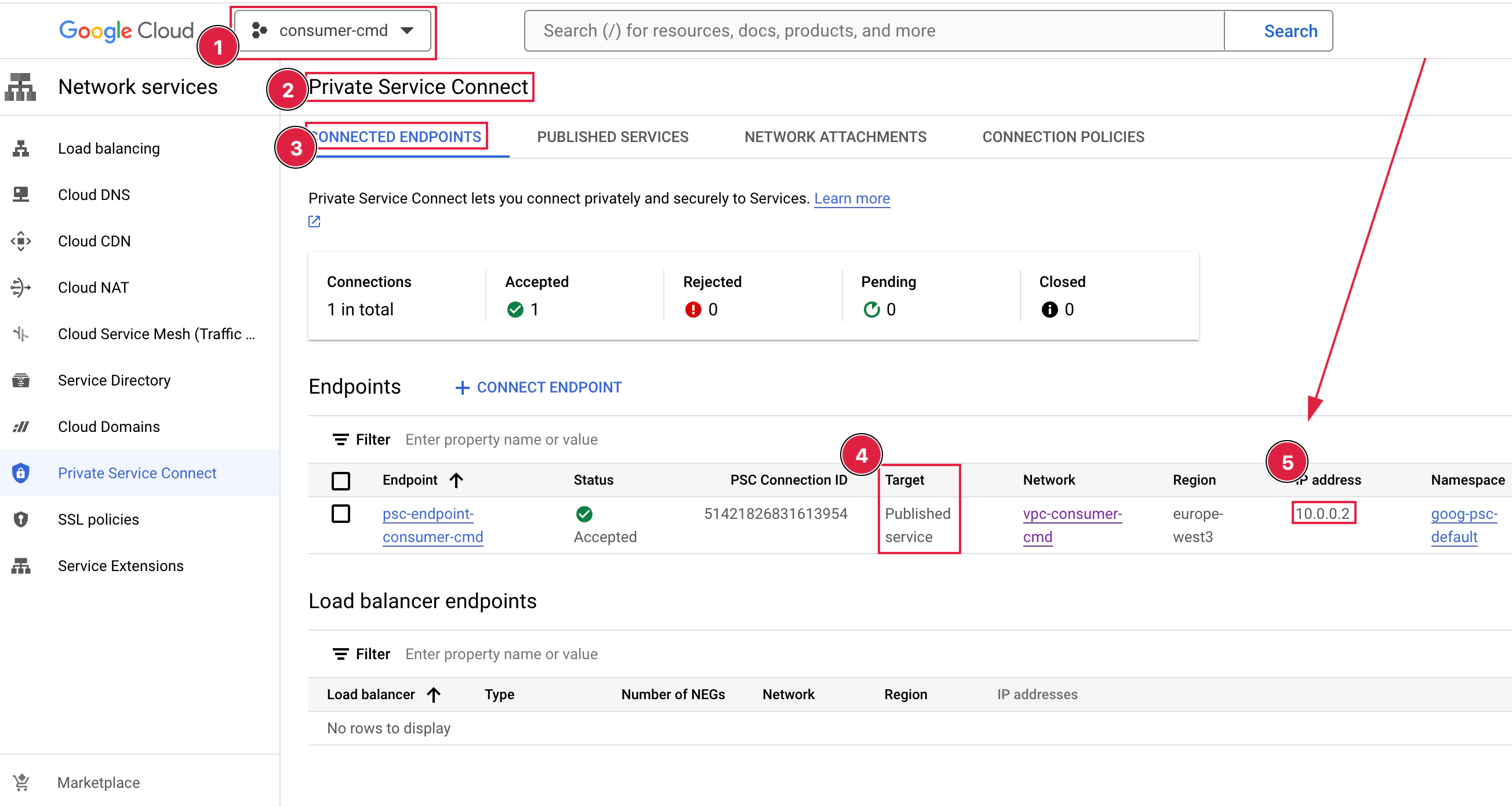
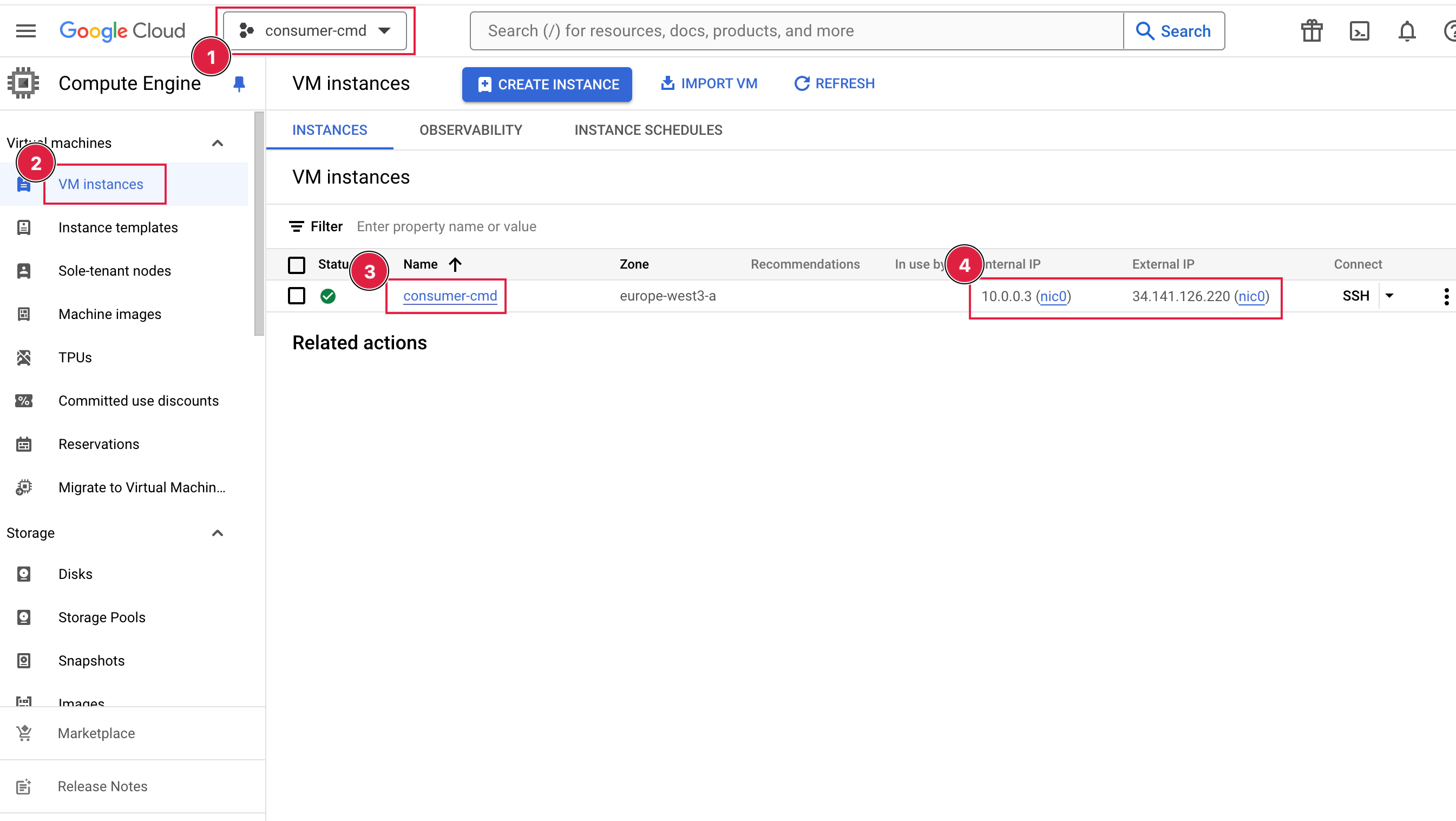
Producer section
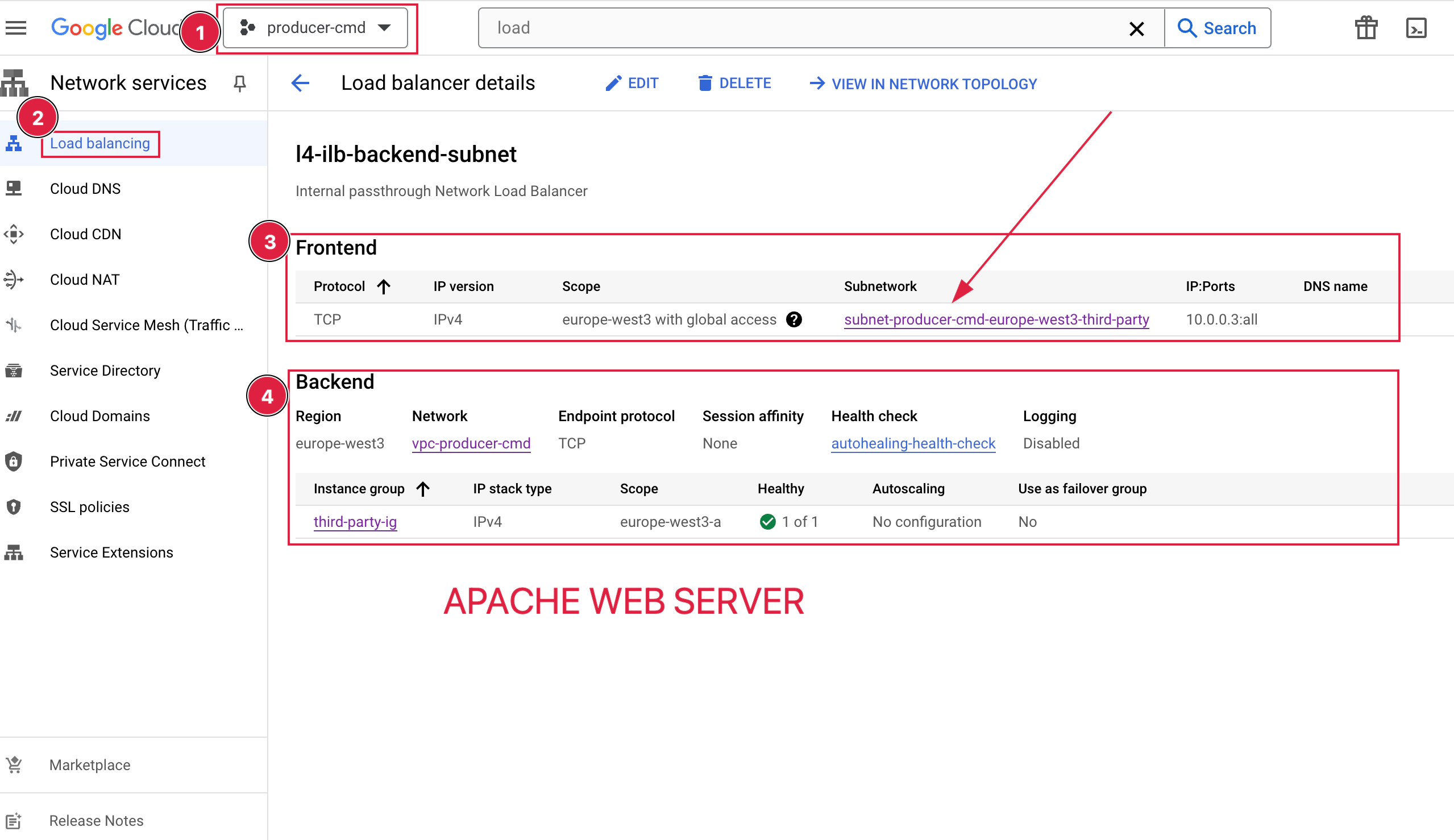
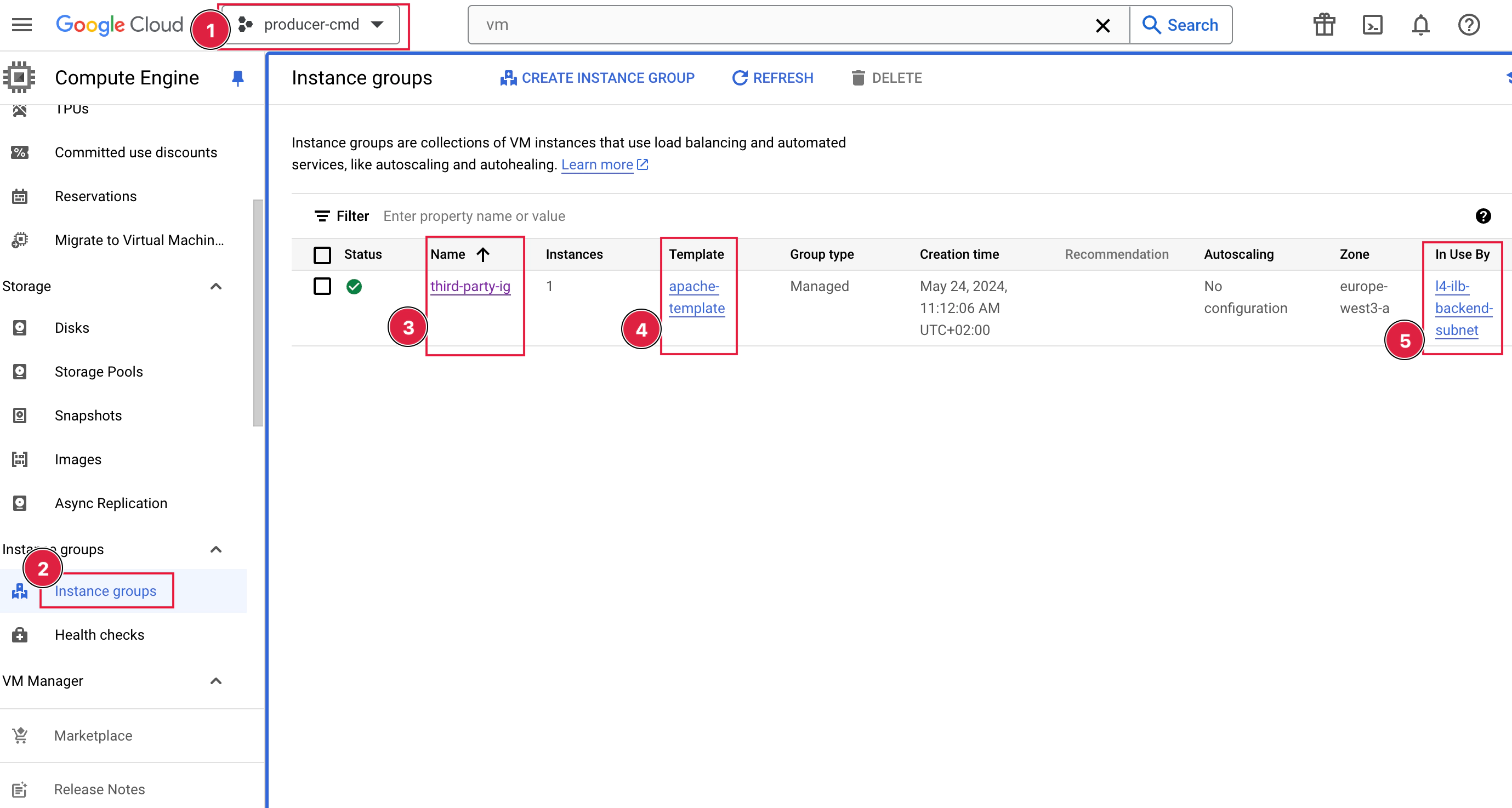
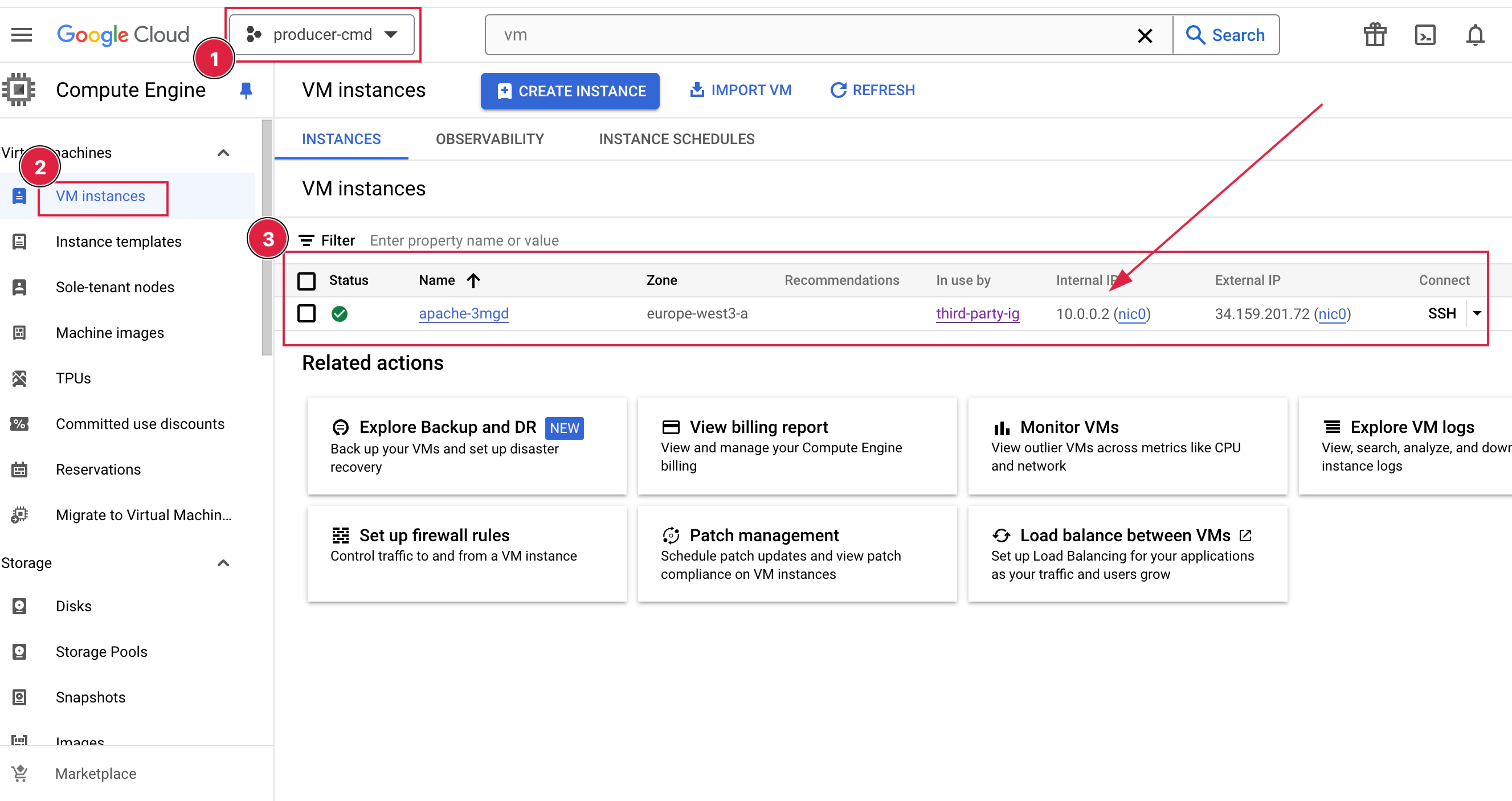
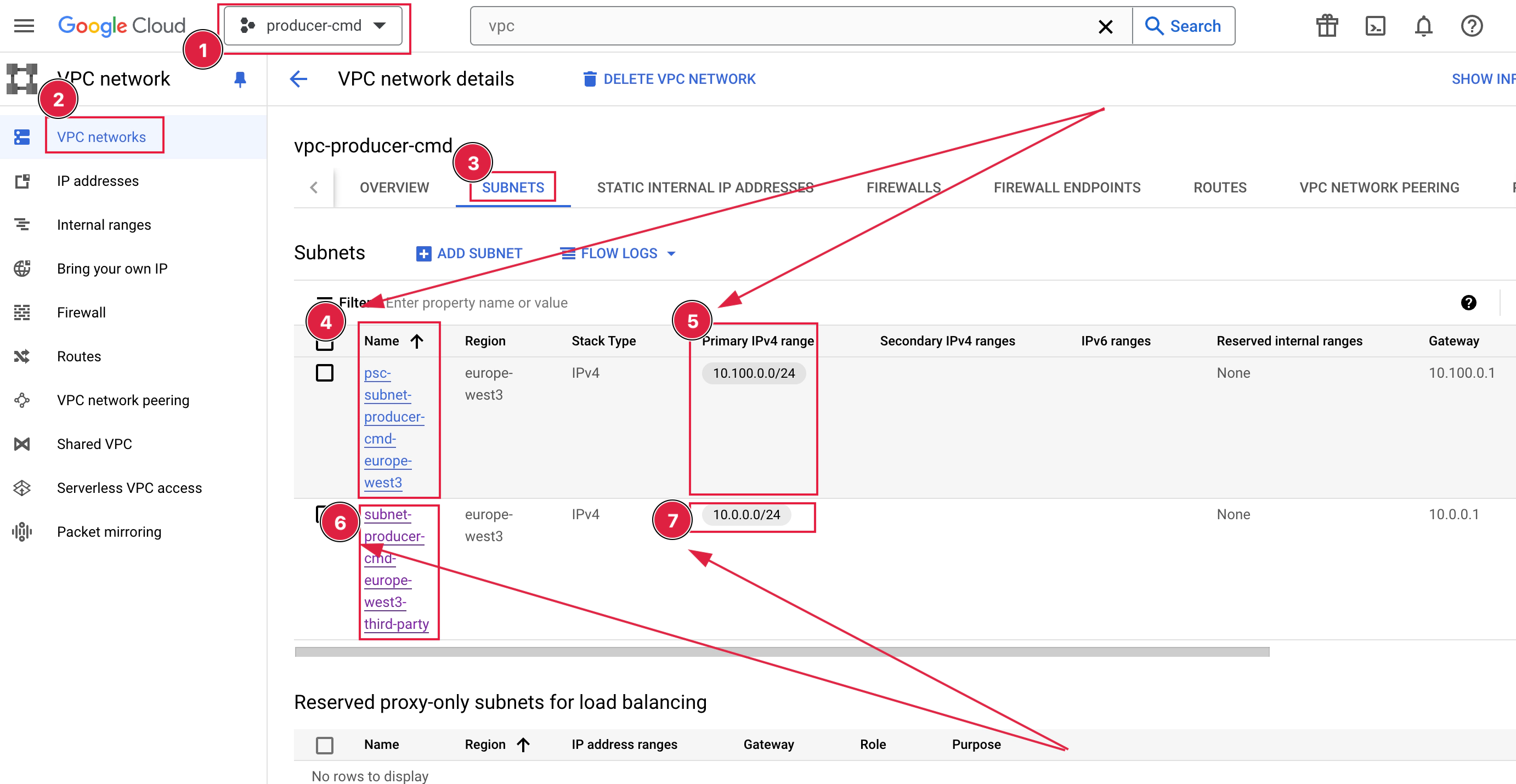
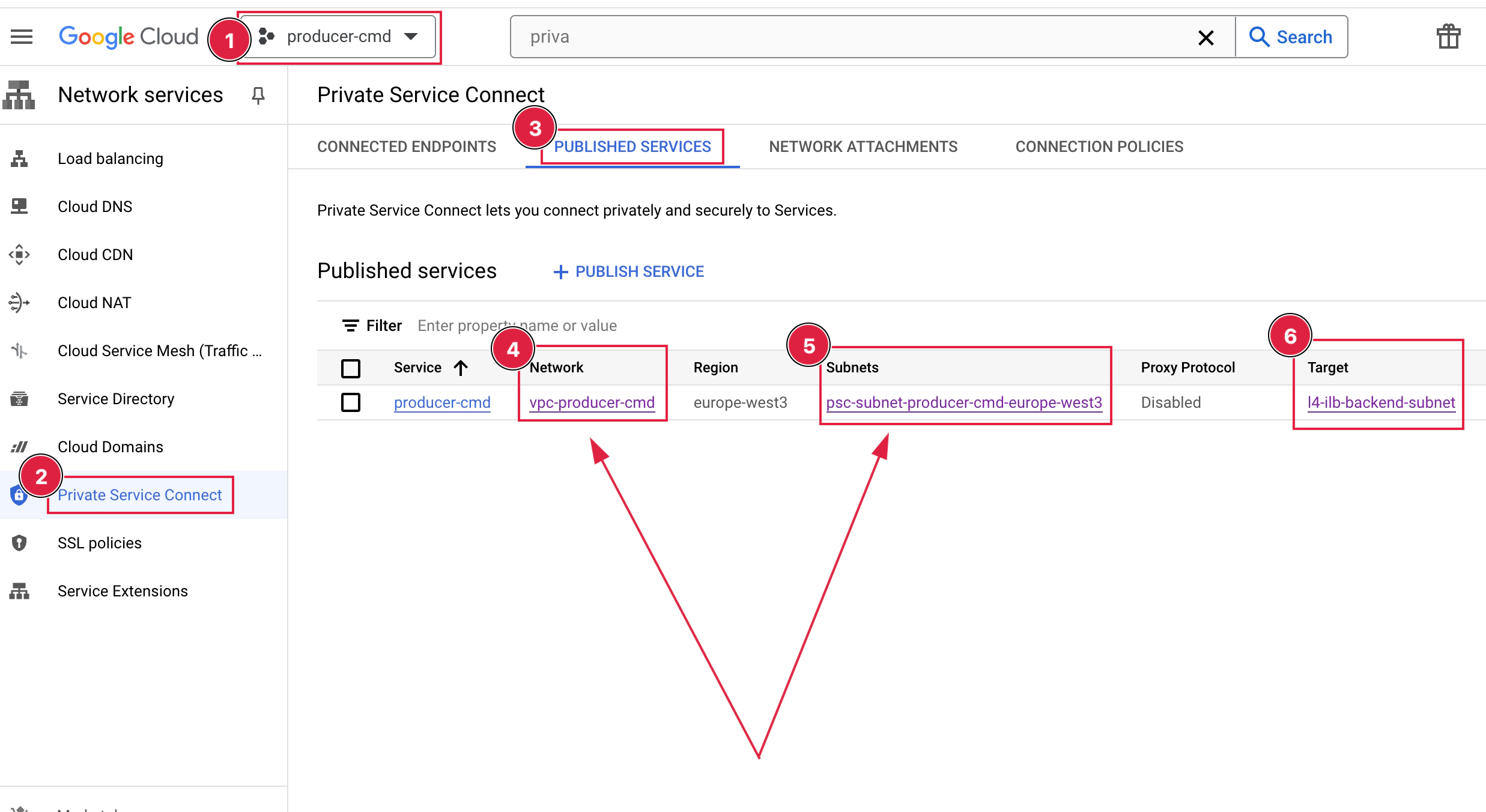
Video: https://www.youtube.com/watch?v=PUxvJJeSrIc
Links:
202405172005